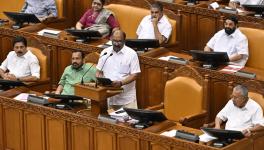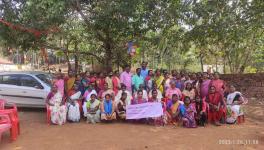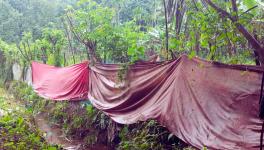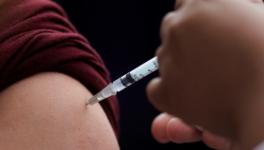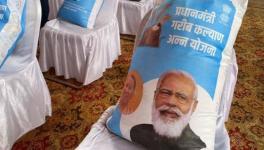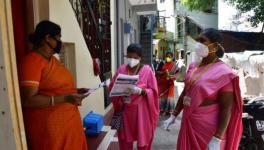No Room for Fake News and Rumours: Kerala Beats Nipah Virus Again
Image for representational use only.Image Courtesy : Scroll
The fatal Nipah virus, which has resurfaced in Kerala after a year, is under control with quick action from the state’s Health Department and massive awareness campaigns.
Though Nipah virus is a zoonotic virus (it is transmitted from animals to humans) and can also be transmitted through contaminated food or directly between people, according to World Health Organisation (WHO), certain Naturopathic practitioners including Jacob Vadakkanchery have come up with a conspiracy theory that Nipah is just a hoax.
Vadakkanchery, who had been arrested last year for asking people not to take Leptospirosis (rat fever) medicine, made a claim that the virus is just a “medicine mafia” thing to milk profit from the people. Disputing the presence of Nipah virus, which had claimed lives of 16 people in May 2018 in the state, he asked the people not to visit hospitals if they get fever. He claimed in a Facebook video, “If you feel feverish, drink enough pure water and stay at home.” However, his claims have been refuted by medical professionals.
“People have no confusion in case of Nipah and they follow the directions by the Health Department and the government,” said Dr B Ekbal, a public health activist from the state.
Read More: Nipah Lessons: ‘It is High Time ‘One Health’ Concept is Applied in Public Health Surveillance’
A few right-wing activists, on the other end, are targeting a nurse, Rubi Sajna – who had played a crucial role during the 2018 Nipah outbreak – risking her own life like many other medical staff members. Many of these activists are widely sharing her photo with the caption: “she, a jihadi, will cheat us”.
Sajna, the Kozhike district committee member of Kerala Government Nurses Association (KGNA), however, said that she won’t budge because of such attacks. KGNA has also issued a statement in support of Sajna, saying: “We won’t give up even if you accuse us in the name of caste and religion.”
The state Health Minister KK Shailaja has strictly warned people who propagate fake news and unscientific information. After confirming infection of the Nipah virus in a 23-year-old student in Ernakulam, the minister held a press conference to sensitise people against fake news on social media.
Along with the Medical Department, a team named as ‘Arogya Jagratha’ is also battling the fake news and is striving to spread scientific information. The platform was set up in 2018 after the Nipah outbreak in the state.
Read More: How Kerala Controlled Nipah Outbreak With Quick Action and Mass Awareness
Chief minister Pinarayi Vijayan wrote in a Facebook post: “We request everyone to follow the instructions of the Health Department. Stringent action will be taken against those who spread misinformation.”
During the outbreak of Nipah in 2018 too, social media platforms were flooded with fake news and rumours. Some of the videos propagated unscientific information, saying that the virus is transmitted through chicken.
Dr Ekbal, however, explained “Certain fruit bats are the carriers of this virus here and the virus is transmitted to humans through the fruits which have been bitten by these bats.”
“This transmission occurs in two-three situations. If the bats are stressed – which happens due to the low availability of food due to deforestation. Another chance of transmission is during the bats’ reproductive cycle spread across April, May and June,” said Dr Ekbal.
“Experts had warned about the possibility of resurfacing of the virus this year too, so we were very vigilant and well-prepared to deal with it,” said Shailaja in an interview.
Yet another false narrative, which is doing rounds on social media is that Kerala is becoming a hub of many such diseases including dengue, H1N1, chikungunya etc. While responding to this, the minister said: “It’s not like that. Every part of India is battling with such issues. However, we have very efficient system and we are very vigilant about it. Here, all such cases, including the cases from private hospitals are being reported. So, we are able to tackle such issues in the first phase itself. We trace the reason, and try to overcome it.”
Read more: Kerala Government Honoured by American Virology Institute for Nipah Virus Containment
After the Nipah outbreak in 2018, the Kerala government had established a virology institute in Thiruvanthapuram. The advanced works in the institute, which is supposed to have a Bio Safety Level 4 lab (BSL 4), is going on. An existing lab in Alappuzha, which has BSL 2 facilities, is being upgraded to BSL 3.
The latest reports say that the condition of the Nipah positive patient is improving. Also, the samples of body fluids of six patients at the Government Medical College Hospital in Kochi that were sent to the National Institute of Virology, Pune, have tested negative.
More About Nipah Virus
Nipah virus is an emerging zoonotic virus (transmitted from animals to humans) and can be proved fatal. According to World Health Organisation (WHO), the fatality rate is estimated at 40% to 75%. This rate can vary depending upon the local availability of epidemiological surveillance and clinical management.
Infection by Nipah virus causes range of clinical presentations—from subclinical (asymptomatic infection) to acute respiratory infection and also fatal encephalitis. People who survive the infection also have been reported to have long-term neurologic conditions. Almost 20% of patients are left with permanent and residual neurologic consequences like seizure disorder and personality changes. Even after recovery, the threat of relapse lingers on, and patients may suffer from the onset of encephalitis.
But, till now, there is no direct medication or vaccine available to treat the Nipah infection. Even the WHO R & D blueprint list of epidemic threats recognises Nipah as the subject that needs urgent and immediate attention.
Although prevention is the best option for any infectious disease, given the long-term consequences of the infection, medication and development of vaccine against Nipah is an utmost necessity.
Get the latest reports & analysis with people's perspective on Protests, movements & deep analytical videos, discussions of the current affairs in your Telegram app. Subscribe to NewsClick's Telegram channel & get Real-Time updates on stories, as they get published on our website.









